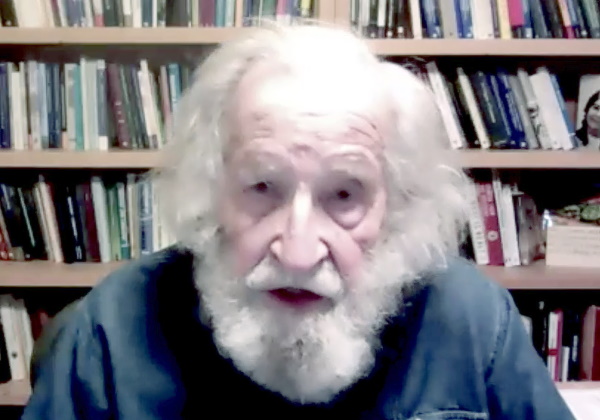
As you can see by this third post of the day on the same topic, I'm rather enjoying this interview: Noam Chomsky on Jung, Wittgenstein, and Gödel (Ask Me Anything), and this time I'm not nitpicking his answers, but I find him confirming a hunch I developed as a component of a larger theory on the origins of mathematics.
For well over a decade, I've been studying the origins of math, by reading books on the history of mathematics, as well as books and scientific papers on how the brain embodies mathematics, and also similar research on the origins and limits of language, and by doing many careful thought experiments which circle around the concepts of zero and infinity -- the two "endpoints" of mathematics (which I believe are actually two sides of the same thing).
As I have been studying these things, I'm developing a pretty comprehensive, and rather unique, idea of the foundations of mathematics. After years of study, I've finally found a way to go beneath set theory and figured out how to set it on a more solid foundation. This "antifragile" foundation reveals the true nature of things like the Axiom of Choice -- which is the C in ZFC set theory -- and why it is out-of-order and therefore... fragile. In this pursuit, I've also determined that category theory is mostly just another way of doing set theory, and type theory is... although headed in the right direction, well, it needs to be completed. No one using it yet sees its true beauty.
I've written about elements of that developing theory many times here in this blog, but there is more that I've written privately and never published. One of the elements that I worked out was how mathematics arises from language. It's an important point, required early in understanding the theory, but until today it has been speculative. Now, thanks to the following quote from Chomsky, I know that there is enough evidence to move it out of speculative into well-supported by research and most likely. Just need to dig around and find out what research he's talking about here. If you know what he's talking about, feel free to add a comment pointing me in the right directions. This is Chomsky:
Well, one possible answer which we can now formulate (don't know if it's true) is that it could be that our arithmetical knowledge (not the numbers -- that's a different question, but our knowledge of arithmetic) could be an offshoot of language. Turns out, if you take the most elementary principles that yield linguistic structures, and you reduce them to their absolute minimum (a lexicon, which contains one element) you get the successor function, and something like addition. So, you get the rudiments of arithmetic. And it's possible that the reason we have knowledge of arithmetic is because we have language, and that this is just an offshoot of it.
So there you have it, folks, straight from the horse's mouth. Yes, math arises from within the language apparatus (meaning, that math is not a separate thing which is communicated by language, but instead that it is, so to speak, a child of language.)
The way it's phrased, though, raises the distinct possibility of an interesting thought experiment: which came first? Language or math? We know that math is, according to brain studies, the most "certain" of all of our intellectual endeavors. Underneath all its elaborate beauty, certainty is its dominant characteristic, that which separates it from other pursuits. So, did language arise from a pursuit of certainty? My hunch is no, but rather that a pursuit of certainty arose soon after language developed.